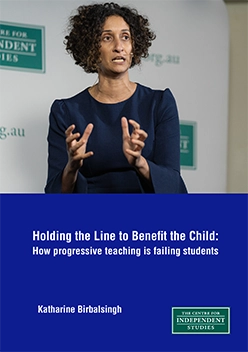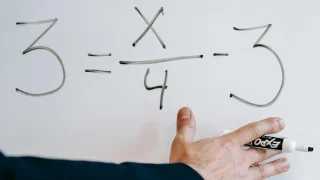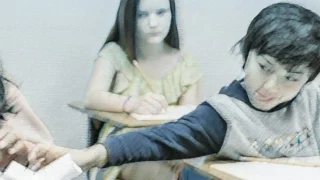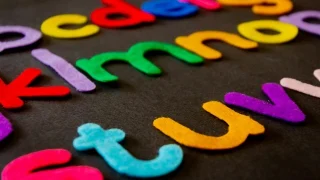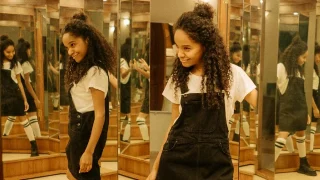

Katharine Birbalsingh has been described as ‘Britain’s meanest headmistress’ because of her use of detentions and rigorous application of school rules. She has countered her critics by saying that true meanness is to keep a child illiterate and innumerate.
Introduction
Katharine Birbalsingh is a New Zealand-born teacher who has returned to traditional teaching methods and with strong discipline at a school she started in London with outstanding results. A guest of the Centre for Independent Studies, she has delivered a number of talks on her methods and their success. Katharine believes in front-of-class teaching and the instilling of proper values, as well as strict discipline. This has earned her the condemnation of progressives within her profession, but the gratitude of parents.
Katharine has been described as ‘Britain’s meanest headmistress’ because of her use of detentions and rigorous application of school rules. She has countered her critics by saying that true meanness is to keep a child illiterate and innumerate.
She says the thing people need to understand is that true compassion, and to be caring and loving, is not letting a disadvantaged child off easy, but to hold the line.
The results of her methods speak for themselves. Her school, the Michaela Community School near Wembley, this year topped the British Progress 8 tables which measures the progress of students through secondary schooling. The school was founded only eight years ago. Its rating of 2.27 means that a student attending Michaela, on average, ends up more than two grades higher than would have been achieved at another school.
Holding the Line to Benefit the Child: How Katharine Birbalsingh says progressive teaching is failing students
It makes you angry when you see children being let down; so angry that you’re willing to throw the rule book out and stand up against what everybody tells us to do. Because unfortunately nowadays, in Australia, in Britain, in the whole of the Western world, in order to get things right with teaching children, you have to go against the grain. That’s the situation we’re in.
It means that all of us have to be able to find enough courage to stand up against what everybody tells you. And when I say everybody, I mean the teacher training colleges, I mean your friends. I remember I met a woman at a party and she told me how she was going to leave London in a year because her eldest child was 10 years-old, coming up towards secondary, and wanted a decent school. The parents were relatively well off. So I said, “Why don’t you think about going to a private school?” She said, “Oh no, no, I couldn’t do that. We’d lose all our friends.”
That’s what I mean about having courage. Even if you are not involved directly in education, we all need the courage to be able to stand up to everyone we speak to, because that is what empowers people like us who are on the ground — knowing that there are families who want this, that there are people in the media who will support us with this.
Most principals, most teachers just want normal lives. They want to be able to pay their mortgage, they want to have a car, they want to have a couple of kids. They want to have normal lives where they go in and they teach and they come back home. They don’t want to take on the whole world. Me, I spend all my time arguing with everybody. I’m arguing on Twitter and in the press. I’m a strange person. I’m strange that I’m willing to go out and fight every day. Most people don’t want to do that.
Our fight began in 2011. In fact, I came to Australia in 2011 and rang some warning bells. I went to visit schools, but one was really quite shocking in many ways. I remember there were a lot of aboriginal children in the school. They were playing guitar, the teachers were playing guitar and they were doing a lot of singing. I was there for a while and I said, “So are we going to see some maths? Are we going to see some English?” The teachers more or less said to me, “Well these kids aren’t going to really amount to much. Let’s have fun while we can. Let’s sing some songs and let them enjoy life.”
There was an article written about me in which I’d been quoted as saying that people think that I’m mean, because I’m the strictest headmistress in Britain and I have rules and I have detentions. What I think is actually mean is allowing a child off all the time, never giving him [or her] a detention. Doesn’t matter if you haven’t done your homework, doesn’t matter if you can’t sit on a chair. After all, you come from a poor background. So I’m going to forgive you this and I’m going to let you go through school and I’m going to sing some songs with you rather than push through with the maths and English.
Then when you leave, you’re going to be functionally illiterate and functionally innumerate for the rest of your life. That’s what’s mean, right? That is mean — and they call it compassion in the moment. That’s the thing that we need people to understand — ultimately that being compassionate with a child, caring and loving a child means holding the line. I said during that 2011 visit, “Look, you guys aren’t as far along the progressive line as we have gone in Britain. I can tell you what it looks like. We’ve been there. Don’t do it. You’re going to end up failing your kids and your country is going to blow up.” Unfortunately, people didn’t necessarily listen to me and you went down that road. Now it’s the case that you are 70th out of 77 countries for behaviour climate in your classrooms.
The children who most suffer because of this are the most disadvantaged. They’re the ones that come from minority backgrounds, from poorer backgrounds and so on. The reason they suffer the most is because they are entirely dependent on their school to be able to make that difference for them. If you come from a more well-off family, the family can make up that difference. The family takes you to museums on the weekend. They have dinners around the table and talk about the politics of the day. They take you away on holiday to various places. You have conversations and they are teaching you all the time.
But the child that comes from a poorer family doesn’t have that. They’re dependent entirely on their school and on their teachers. And if their teachers, through what they believe to be compassion, are constantly letting that child down by not holding them to account, that child has nowhere to go. They end up in prison, on welfare, or in some dead-end job. Then we say, “Well they were poor. What else could they do?”
It’s not true, though. It’s us who have failed them. We in the education sector have failed them because in the moment we feel so uncomfortable about doing the right thing. I was watching [Marsden Rd Public School principal] Manisha Gazula [in the audience] and I was thinking, isn’t it funny that you and I are the same skin colour? We are not white. We don’t carry the guilt that white people carry for feeling so uncomfortable about their privilege that they can’t possibly hold a brown child to account. They won’t put a brown child in detention because, ‘I’m rich or I’m white and I feel uncomfortable so I can’t do this.’ But who loses out in the end? The brown poor child who is not held to account, the brown poor child who ends up functionally illiterate, functionally innumerate and then spends his [or her] whole life trying to catch up and can’t do it.
We need somehow to be able to see beyond the guilt that is forced on us. I always think to myself how difficult must it be to be a white rich person? I feel for you in this climate. On the one hand, they’re making you feel bad, then you say, ‘Okay, okay, don’t have the detention. Okay, I feel a little awkward about who I am, so do whatever you like.’ Then you’ve got people like me coming along saying, “No, that’s really what is harmful to the child. That’s actually what is racist in that moment, because you are letting certain children down because you feel guilty about your own privilege.” That is what we all need to be able to see beyond.
It was at the same time that I had the idea about Michaela [Community School in London] and started setting it up. The fight in Britain was massive at that time. It’s much easier now to set up a free school. A free school is a school that’s a normal public school in terms of how it’s funded and the admissions process. But you can set it up yourself and you can apply through the Department for Education. It took us three-and-a-half years to open our school because there was such a fight. We would have events like this where families would be invited. I would go along in Brixton Market, handing out flyers about our school. Moms thought it was a brilliant option and many ethnic minority mothers would be sitting in the audience, like this, listening to me speak about this possible new school.
But people were bussed in from outside of London. The moms were ethnic; the people being bussed in were white. They would sit amongst the crowd and then they would stand up and shout at me in order to drown out, not just me, but what my group were saying in order to set up the school. We had to move to three different areas in London to eventually open up in Wembley. We started in South London and were chased from place to place until eventually, by some kind of miracle, we managed to open our school in 2014.
We opened with 120 children. We have been growing ever since. We’ve now got a full school. Every year we send our few off to Cambridge and to Oxford, but it’s not just that. We’ve also got other kids who might become plumbers and hairdressers and so on, but they turn up on time. They know how to stand up and how to sit up straight. They know how to bring their equipment. They know how to say good morning and good afternoon, sir and miss. As they walk down the corridors, they are happy, and this is the point. You are happy when you are successful. You are happy when you know who you are and what you can deliver.
Just recently, GCSE Progress 8 scores for schools came out in Britain. The Progress 8 score is essentially how much progress you have made from when you joined at the end of primary to when you leave at the end of secondary school. This year we got the top Progress 8 score in the country, which was great to see and great to know just how much of a difference [we made]. So to give you a sense, we’ve got a Progress 8 score of 2.27, which means that, on average, kids that go to our school end up with more than two grades higher than they would’ve done had they been to another school.
On the one hand you think, wow, then the detractors say that it’s not about results. Results don’t matter. I would agree with them to a certain extent. Results aren’t the only thing that matter, but they do matter. We need to remember that. However, the thing I am most proud with our school is the children, who they are. They’re polite, they’re decent people. They have traditional values. When I say traditional, they believe in personal responsibility. They believe in having a duty towards others. We’ve taught them to be grateful.
One of the reasons families love us is that suddenly the kids at home are thanking their moms for making them dinner Parents think, well this is quite nice actually. My child suddenly understands all that I do for him. We teach them these values, we teach them gratitude because when you are grateful, no matter how little you have, you are a happier and better person.
We have traditional discipline. We expect children to be polite. We expect them to go the extra mile to help someone else out. If in the canteen a child drops a plate in a normal inner city school, all the kids start shouting and banging on the table. That is the kind of thing they do. Our kids, if somebody drops a plate, five or six of them run to help them pick it up and the food from the floor. That is the kind of people that I want our children to be. Traditional values and then traditional behaviour and discipline — and explicit teaching. I spoke to a group of teachers yesterday trying to give advice about how to make explicit teaching work. Twenty to 30 years ago, it was normal for every teacher to just teach from the front. As you are looking at me now, you’re listening to what I’m saying. It’s much easier to do that if you’re looking at me, but in most classrooms these days you wouldn’t be looking at me. You would be facing each other. Imagine if I was giving this lecture and instead of looking at me, you were looking at those books and you were looking at the mirrors by the windows back there. I mean it’s a bit weird looking in that direction and yet I’m standing over here. But this is the reality of our classrooms, that special needs children are looking at the back of the wall when the teacher is at the front.
The reason that’s happening is because the teacher isn’t leading the learning. The teacher has been taught by the teacher training agencies not to do this. The teacher feels guilty. What I was explaining yesterday is that we have been taught that teaching is cheating. That’s what we think. So teachers genuinely think, oh no, I mustn’t tell them because that’s somehow giving them the answer. How are they meant to know that this is a triangle and this is a square unless you tell them? You have to tell them. Once you’ve told them, you can then ask them a little bit later, “Tell me, which one’s the triangle, which one’s the square?” If you have never told them, they can’t possibly know it.
As I say that, it seems obvious. I promise you in the education sector nowadays, it is not obvious. We are all taught that somehow this information is inside them and that we need to draw it out. The story I always tell is when little Amy is sitting at the front and you are asking a question [of the class] to which you haven’t told them the answer; you haven’t taught them this. You’re imagining you’re drawing it out of the child. But little Amy knows the answer. Why? Because when she goes home in the evenings, she sits with her parents and talks about the issues of the day and reads the books in her parents’ bedroom. She also goes to museums and art galleries and so on. So every time you ask a question, little Amy knows the answer.
Little Johnny at the back of the classroom has no idea, and he thinks to himself, ‘gosh, how come Amy always knows the answer? I must be really dumb.’ Because what Johnny doesn’t think in that moment is, ‘I must be from a different socio-economic background.’ He doesn’t think that. What he thinks is ‘I’m dumb.’ He then misbehaves and he keeps on misbehaving because his self-esteem takes a hit every time the teacher asks a question to which he doesn’t know the answer. Eventually he gets sent out of class and. gets a special needs stamp on him, which ruins him forever. Then, when he leaves school functionally illiterate and functionally innumerate, we say, ‘it was because he was poor.’
But that was not the reason; it was because we never taught him properly. All we need to do is have traditional values, traditional discipline, and traditional teaching. The problem is that this is so simple and yet it is impossible to make happen. It’s a fascinating situation that something so very simple, that 50 years ago we all took for granted, now is a fight. And it cannot just be our fight. It has to be the fight of all of us because you and I will lose if it’s just us. We need all of you, and all of us need to understand your country, Australia, lies in the palm of your hands right now. You can turn this around, but it requires all of us to make that effort. It requires all of us to believe that you can change your country.
The children really are the future. I have never understood why people don’t take education more seriously. Children are the future to any country, and if you care about Australia, if you love Australia, you need to be courageous enough to stand up and be counted. Because if you are here today, it’s because you want to hear the truth. Thomas Sowell, a great hero of mine, an African-American social theorist and economist, has a quote, which says, “If you want to help someone, you tell them the truth. If you want to help yourself, you tell them what they want to hear.”
We need to always know the truth, however uncomfortable it makes us feel. But the fact is, the old adage is true. Only the truth will set us free.
ALSO READ: Myths That Undermine Maths Teaching
